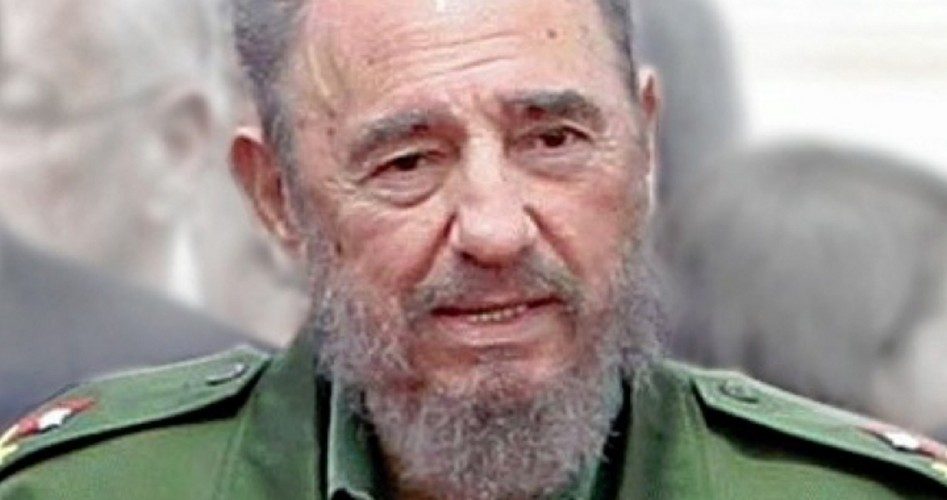
Fidel Castro is dead, but the communist tyranny he imposed on the Cuban people lives on. Unfortunately, much of the American media are trying to bury the truth about his murderous regime — and those in America who helped Castro come to power — with him.
In its coverage of Castro’s passing on Friday, the increasingly discredited mainstream media is downplaying or ignoring Castro’s crimes against humanity — and generally refers to him as the “former Cuban leader,” as opposed to a dictator, which he was. He was also a mass murderer, and his brutal oppression of the Cuban people caused many of his fellow citizens to risk their lives to flee their island homeland in rafts and whatever else might float.
Castro was 90 years old at his death, having turned over power to Raul nearly a decade ago, due to Fidel’s declining health. News of the death of the tyrant touched off celebrations in Miami’s Little Havana in south Florida.
Despite the glossing over of inconvenient facts about the Castro brothers by most of the American media, the Cuban community of exiles in Miami know the truth. That is why they or their ancestors fled their Cuban homeland at some point since Castro’s seizure of power in 1959.
Castro was born August 13, 1926, the son of a Spanish immigrant who was a sugar plantation owner. In contrast to those who mistakenly believe communism is a product of the “exploited” working class, Castro was not drawn to the ideology of Marx and Lenin by toiling in the cane fields. He was introduced to the ideas of communism while a student at the University of Havana, where he received a social science degree.
In 1953, the Castro brothers joined with others in an attack on a military barracks in Santiago. The attack failed, and the brothers wound up in prison, only to be eventually pardoned. Fleeing to Mexico, they brought together rebels who returned in 1956, organizing a guerilla band in the mountains of the eastern Sierra Maestra.
By January of 1959, Castro led his victorious rebels into the streets of Havana, where he established a new government. Fulgencio Batista, who had ruled Cuba for several years, had shortly before fled the country. The United States was among the first nations to establish diplomatic relations with his government.
How had Castro done it?
Castro’s improbable taking of absolute power is largely the result of media reports by the New York Times and machinations by the U.S. State Department under President Dwight Eisenhower.
Writing in None Dare Call It Treason, John Stormer explained: “Castro was supported by but a few dozen bandits and a handful of Communists in May 1957, when a career diplomat with a questionable record was named to head the Caribbean Desk in the U.S. State Department. His name was William Arthur Wieland.”
According to a report prepared by the U.S. Senate’s Internal Security Subcommittee, Wieland was vice consul in Bogota, Columbia in 1948, when a young Cuban revolutionary, Fidel Castro, was a leader of Communist-inspired riots. During the riots, Castro took over a radio station and announced, “This is Fidel Castro. This is a Communist revolution.”
Wieland knew about Castro’s communist-supporting activities in Columbia, yet he was the instigator of an arms embargo against the anti-Communist Batista regime in the late 1950s. Wieland removed all anti-Castro diplomats from their positions, including the American ambassador to Cuba, Arthur Gardner. Gardner had sent several reports to the State Department, warning his superiors that Castro was a communist. When Earl Smith replaced Gardner, Wieland sent Smith to Herbert Matthews, a New York Times reporter, for background on Castro.
Smith later testified to the U.S. Senate, after Castro’s take-over. “Three front page articles in the New York Times early in 1957, written by editorialist Herbert Matthews, served to inflate Castro to world stature and world recognition. Until that time, Castro had been just another bandit in the Oriente mountains of Cuba, with a handful of followers.”
In his articles, Matthews compared Castro to Abraham Lincoln and to Jose Marti, hero of Cuba’s wars of independence from the Spanish Empire. This was not the first time that Matthews had lionized communists, having written articles in 1936 in support of the communist side in the Spanish Civil War.
Matthews assured his New York Times readers that Castro was not a Communist, but was rather a champion of liberty and democracy. Castro, was, according to Matthews, a man who “has strong ideas of liberty, democracy, social justice, the need to restore the Constitution, to hold elections.” Batista, on the other hand, was pictured as just another right-wing dictator.
He was not alone among the American media in backing Castro during his rise to power. Edward R. Murrow of CBS television produced a very positive documentary on Castro. Ed Sullivan, the host of what was then one of TV’s most-watched variety shows, even traveled to Cuba and filmed an interview with the young revolutionary. Thirty million viewers watched as Sullivan asked Castro, “You are not a Communist are you, Fidel? You are a devout Catholic, aren’t you?”
Sullivan ended the documentary with an over-the-top endorsement of Castro. “The people of the United States have great admiration for you and your men because you are in the real American spirit of George Washington.”
A year and a half later, Sullivan publicly apologized for his support of Castro, when it became apparent that Castro was no George Washington.
William Atwood of Look magazine wrote in March 1959, “We can thank our lucky stars that Castro was no Communist.” Dickey Chapelle of Reader’s Digest even said in April of 1959, “The Cuba of Fidel Castro today is free from terror. Civil liberties have been restored, and corruption seems to be drying up.” And Newsweek even wrote in the same month, “Castro’s vision has a capitalist base. He wants a country in which every farmer owns his land.”
In 1960, Secretary of State Christian Herter, however, said, “I don’t think anyone could say affirmatively that Cuba is Communist at the present time.” Of course, that was not true, as many Americans, including Ambassador Smith, candy maker Robert Welch (who founded The John Birch Society, the parent organization of The New American) and many others repeatedly warned that Castro indeed was a Communist. Even Vice-President Richard Nixon privately told President Dwight Eisenhower that Castro was a Communist!
Despite all this, President Eisenhower said in 1963, “It would have taken a genius of prophecy to know that Castro was a Communist when he took control of Cuba.”
John Birch Society (JBS) founder Robert Welch and the others who had it figured out must have been geniuses then. In December 1958, at the founding meeting of the JBS, Mr. Welch warned about Castro, declaring, “If you have the slightest doubt that Castro is a Communist, don’t. If he is successful, time will clearly reveal that he is an agent of the Kremlin.” Three months earlier, Welch had warned in American Opinion (the predecessor of The New American), “Now the evidence from Castro’s whole past, that he is a Communist agent carrying out Communist orders and plans, is overwhelming.” Later, he added, “Castro is a Communist. Period. He is not just pulled and tugged by Communist influences and steered by Communist advisers. Fidel Castro himself has been a conscious and dedicated agent of the Kremlin ever since his student days. His whole ‘revolution’ followed the Communist pattern, used Communist techniques, and was supported and managed by Moscow.”
The truth is that the Eisenhower administration had been instrumental in bringing Castro to power. In March 1958, U.S. Secretary of State John Foster Dulles severely damaged the Batista government by refusing to ship 1,950 Garand rifles legally purchased by the Cubans.
Speaking before the U.S. Senate in 1960, Ambassador Smith said, “Without the United States, Castro would not be in power today.”
Later, Smith wrote a letter published in 1979 in the New York Times, in which he still held to that belief. “The final coup in favor of Castro came on December 17, 1958. On that date, in accordance with my instructions from the State Department, I personally conveyed to President Batista that the Department of State would view with skepticism any plan on his part, or any intention on his part, to remain in Cuba indefinitely. I had dealt him a mortal blow.”
Fourteen days later, the Cuban government fell, and was soon replaced by the Communist dictatorship of the Castro brothers. This pattern has unfortunately been repeated many times, notably with President Jimmy Carter’s undermining of the Shah of Iran and the anti-Communist Anastasio Somoza in Nicaragua.
The help the U.S. government gave to Fidel Castro was bipartisan, however. While Eisenhower was a Republican, the Democrat John Kennedy administration inherited a plan from Eisenhower, concocted by the Central Intelligence Agency (CIA), for an invasion of Cuba by exiled Cuban freedom fighters. Kennedy approved the plan, with some modifications, promising to provide an “air umbrella” to keep Castro’s air force out of the action. But that did not happen, and the 1,400 Cuban exiles landed at the Bay of Pigs in April 1961, not knowing that they would not have that air cover.
CIA radio broadcasts were also promised to alert over 100 underground operations, but they were never transmitted. By the time it was apparent that the Bay of Pigs was the invasion site, it was too late for these internal anti-Castro forces to provide any help to the brave freedom fighters.
The Brigade fought bravely for three days, inflicting over 2,000 casualties on Castro’s overwhelmingly numerically superior forces. The small band of doctors, lawyers, common laborers, and university students were either killed or taken captive.
The next year, the United States and the Soviet Union faced off in the Cuban Missile Crisis, when Soviet dictator (not just a “leader”) Nikita Kruschev planted nuclear missiles in Cuba. In the next several years, Castro gave assistance to the world communist effort by sending Cuban troops to places such as Angola.
Inside Cuba, the people there felt the full weight of life under a brutal communist dictatorship. Soon after coming to power, Castro announced the need for gun registration, ostensibly to fight gangsterism on the island. Nine months later, he simply rounded up the guns, asserting that there was no longer any need for individual citizens owning guns.
Armando Lago, a Harvard-trained economist, has estimated that almost 78,000 may have died trying to flee Cuba since Castro imposed his Communist dictatorship on the island. Lago, writing in The Black Book of Communism, was able to document nearly 100,000 killed by Castro, either by firing squads, assassinations, or deaths in prisons, or by attempting to flee the island through the treacherous waters between Cuba and Florida, 90 miles away.
Miguel Faria, writing in his book Cuba in Revolution, said, “Since Fidel Castro took over the island in 1959, the best figures that we can glean is that between 30,000 and 40,000 people have either been executed [by firing squad or at the hands of their jailers].”
Of course, the exact numbers of Castro’s killings cannot be known with certainty. Then, of course, there is the reduction in the standard of living imposed on the country under the command economy of communism. Before Castro, the Cuban economy was ranked the second-highest in Latin America.
In 2008, Castro’s failing health, reportedly from an intestinal disease, led him to surrender day-to-day power to his communist brother Raul. But, as Fidel Castro had said in five-hour TV speech on December 2, 1961, “I am a Marxist-Leninist and will be until the day I die.” That was certainly true, but in his path to power, he had hidden this belief from some of his followers who actually believed he was for liberty. He explained his lie was necessary, “because otherwise we might have alienated the bourgeoisie and other forces which we knew would eventually have to fight.”
Suspicions remain that Castro, acting in retaliation or defense because of the assassination attempts on his life at the direction of President Kennedy, was somehow involved in the murder of an American president, John F. Kennedy.
All in all, Fidel Castro brought much pain and misery to the world during his 90 years on earth, and it is quite understandable how the Cuban community in Miami is relieved to hear of his passing. Unfortunately, many Americans will remain mystified at the intensity of animosity toward Castro by the south Florida Cuban community, considering the sugar-coated version of his life they have been presented by the mainstream media in the United States.
But they are simply continuing a cover-up of the Castro record, dating back to the 1950s.
Certainly a better perspective was provided by Rolando Perez, founder of Bear Witness Central, an anti-communist group composed to a large extent (though not exclusively) of those who witnessed communism firsthand:
The Cuban people were betrayed by Fidel Castro when fifty-seven years ago, he came to power in a bloody revolution that installed a Communist totalitarian dictatorship. The people of Cuba have suffered an inhuman repression, hundred of thousands unjustly imprisoned, millions of broken and destroyed families, oppression of free speech and the murder of tens of thousands of people during his reign in power.
Perez, who himself lived under communism in Cuba before fleeing from his native land to his adopted homeland, the United States, concluded:
The Cuban people have suffered enough, Bear Witness Central is asking President-elect Donald Trump, the incoming Trump Administration and the U.S. Congress that it is unequivocally clear that the Cuban-American population and the Cuban people want a free Cuba and demand political reforms; and that it does not matter who is in power in Cuba, codified sanctions shall only be lifted upon the release of all political prisoners; the recognition and respect of fundamental human, civil and political rights as prescribed by international covenants; and the legalization of opposition parties, free elections and an independent media.
Enough is enough! Cuba must be FREE!
God Bless America!
Related articles:
Tears to Truth: Obama and Trump React Very Differently to Castro’s Death



